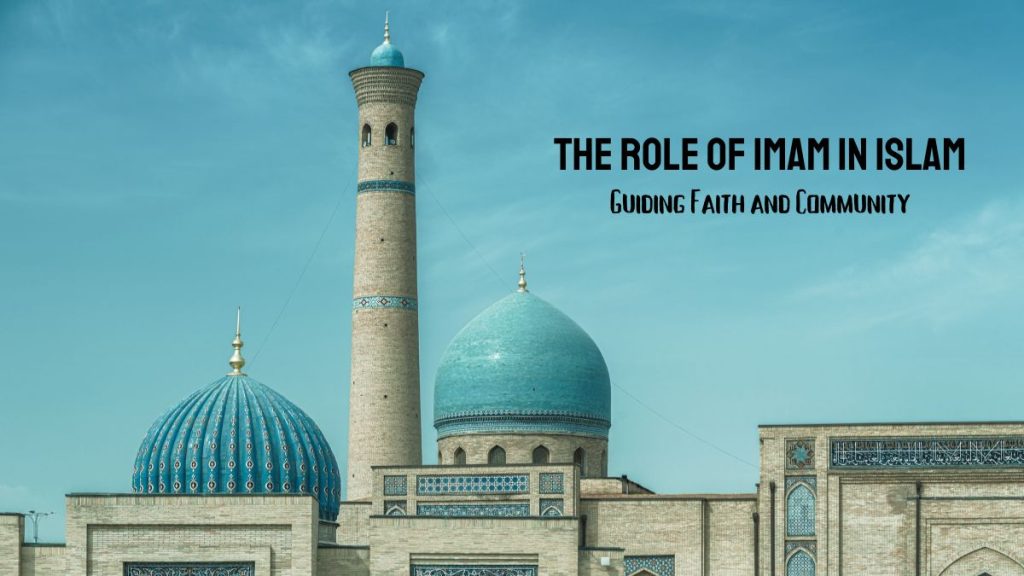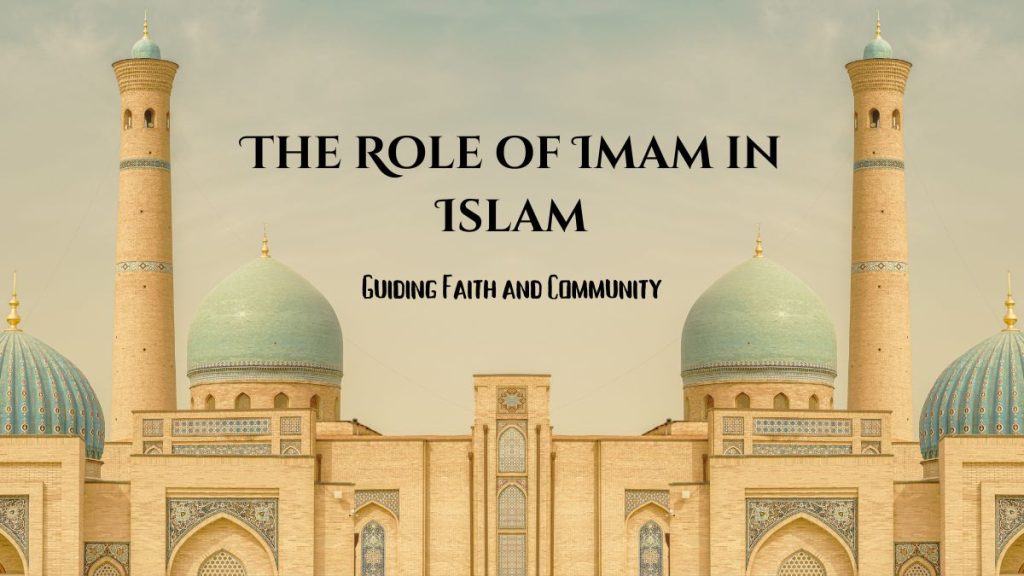The role of Imam in Islam is to lead prayers and guide the Muslim community. Imams also provide spiritual and moral support.
Imams are central figures in Islamic communities. They lead daily prayers, Friday sermons, and special religious events. Imams offer guidance on religious and ethical matters, helping followers to adhere to Islamic teachings. They often serve as counselors, addressing personal and community issues.
Imams also play a vital role in educating the younger generation about Islam. Their influence extends beyond the mosque, impacting social and cultural aspects of Muslim life. By embodying Islamic values, Imams inspire and unify the community. Their leadership ensures the preservation and practice of Islamic traditions and principles.
Related Article: Islamic Spirituality: Unlocking Inner Peace and Enlightenment

Related Article: The Role of Mosques in Islam: Spiritual Hubs and Community Centers
You may also read: Islamic Finance: Unlocking Ethical Investment Opportunities
Imam’s Spiritual Leadership
The Imam plays a vital role in guiding the community. Their spiritual leadership is essential for maintaining faith and unity. An Imam’s responsibilities are multifaceted and deeply impactful. This section explores two key aspects: leading prayers and providing religious guidance.
Leading Prayers
The Imam leads the congregation in prayers. This includes the five daily prayers, Friday prayers, and special occasions. The Imam’s role is to ensure that the prayers are conducted correctly. They recite verses from the Quran and lead the community in worship.
The Imam’s leadership in prayer helps maintain spiritual discipline. It also fosters a sense of community among the worshippers. Here are some key responsibilities of the Imam during prayers:
- Reciting the Quran
- Leading the congregation
- Ensuring proper prayer etiquette
Providing Religious Guidance
The Imam also offers religious guidance to the community. This can involve interpreting Islamic teachings and answering questions. The Imam helps individuals understand their faith better. They provide advice on how to live according to Islamic principles.
Religious guidance from the Imam covers various aspects of life. It includes personal, social, and spiritual matters. Here are some ways the Imam provides guidance:
- Conducting study circles
- Offering personal counseling
- Delivering sermons
In this role, the Imam becomes a source of wisdom and support. They help the community navigate life’s challenges with faith and understanding.
Related Article: Peace in Islam: Understanding its Amazing Transformational Power

Credit: www.ocregister.com
Related Article: Islam And Modernity: Bridging Tradition and Progress
Community Building
The role of an Imam in Islam is multifaceted, but one of the most important aspects is community building. An Imam serves as a spiritual leader, guiding the community in religious practices and fostering a sense of unity and togetherness among its members.
Fostering Unity
An Imam plays a crucial role in fostering unity within the community. They do this by leading congregational prayers, delivering sermons, and organizing religious events. These activities bring people together, creating a sense of belonging and mutual respect.
They also encourage dialogue and understanding among different groups within the community. By promoting the values of Islam, such as compassion, justice, and brotherhood, an Imam helps to build a cohesive and harmonious community.
- Leading congregational prayers
- Delivering sermons
- Organizing religious events
- Encouraging dialogue and understanding
Mediating Conflicts
Conflict is a natural part of any community. An Imam often acts as a mediator, helping to resolve disputes and maintain peace. They use Islamic teachings to guide their mediation efforts, ensuring that solutions are fair and just.
By addressing conflicts promptly and effectively, the Imam helps to prevent divisions and promote a sense of solidarity among community members.
| Conflict | Resolution |
|---|---|
| Dispute over property | Islamic teachings on justice |
| Family disagreements | Guidance on family values |
| Interpersonal issues | Encouraging dialogue |
In summary, the role of an Imam in community building is vital. They foster unity and mediate conflicts, ensuring a strong, harmonious, and cohesive community.
Educational Role
The educational role of an Imam in Islam is pivotal. Imams guide the community through religious teachings. They ensure the transmission of Islamic knowledge. This role is crucial for maintaining the faith and practices of Islam.
Teaching Quran
Imams are responsible for teaching the Quran. They explain its meanings and contexts. This helps followers understand their religion better. Imams often recite the Quran during prayers. They also conduct special Quranic sessions.
Quran classes are organized for children and adults. These classes teach proper recitation techniques. They also delve into the interpretations of verses. This ensures that followers grasp the Quran’s teachings.
Organizing Classes
Imams play a key role in organizing educational classes. These classes cover various aspects of Islam. Subjects include Hadith, Fiqh, and Islamic history. This comprehensive approach nurtures well-rounded knowledge.
- Weekly classes for children
- Adult education programs
- Special workshops during Ramadan
Educational programs help the community stay connected to their faith. They also foster a sense of unity and understanding. Through these classes, Imams ensure that Islamic teachings are preserved and passed on.
Imams often use modern teaching methods to engage students. This includes using multimedia tools and interactive sessions. This approach makes learning more effective and enjoyable.
| Program | Target Audience | Frequency |
|---|---|---|
| Children’s Quran Classes | Children aged 5-12 | Weekly |
| Adult Education | Adults | Monthly |
| Ramadan Workshops | All community members | Annually |
Overall, the educational role of an Imam is fundamental. Through teaching and organizing, they enrich the community’s knowledge. This ensures the continuous practice and understanding of Islam.
Social Services
The role of an Imam in Islam goes beyond leading prayers. An Imam plays a crucial part in social services, acting as a pillar of the community. These services include helping the needy and providing counseling services.
Helping The Needy
Imams actively assist the needy in their communities. They often organize and lead charity drives. They collect donations in the form of money, food, and clothing. These donations are then distributed to those in need.
Here is how Imams help the needy:
- Organizing food drives
- Providing financial assistance
- Coordinating with local charities
- Offering shelter during emergencies
Imams also work with local organizations to ensure that help reaches the right people. This collaboration maximizes the impact of their efforts.
Counseling Services
Imams offer vital counseling services to community members. They provide guidance on personal issues, family matters, and religious questions. These sessions are often held in mosques or community centers.
Key areas of counseling include:
- Marriage and family problems
- Grief and loss
- Religious doubts
- Stress and anxiety
Imams are trained to listen and offer advice based on Islamic teachings. This helps individuals find peace and resolve conflicts in their lives.
Through these social services, Imams strengthen the community and promote well-being.
Related Article: Islamic Lifestyle Essentials: Nurturing Faith & Well-being

Related Article: What Makes Islam Unique: Insights & Distinctions
Imam’s Influence In Society
The Imam holds a significant place in the Islamic community. Their influence extends beyond the mosque. They guide spiritual and social aspects of life. The Imam’s role is vital in shaping ethical values. They also advocate for justice in society.
Advocating For Justice
An Imam plays a crucial role in advocating for justice. They ensure fairness within the community. Imams speak against any form of injustice. They uphold the principles of equality and fair treatment for all.
Imams also mediate conflicts. They help resolve disputes with wisdom. Their guidance promotes a peaceful society. The community looks up to the Imam for fair decisions. This role is essential for maintaining harmony.
Promoting Ethical Values
Imams play a key role in promoting ethical values. They teach about honesty, kindness, and respect. These values are fundamental in Islam. Imams lead by example in their daily lives. Their actions inspire the community to follow ethical practices.
They also educate about the importance of moral behavior. Imams conduct sermons and lectures on ethical topics. These teachings influence the behavior of community members. As a result, the community upholds high ethical standards.
| Key Roles of an Imam | Impact on Society |
|---|---|
| Advocating for Justice | Ensures fairness and resolves disputes |
| Promoting Ethical Values | Inspires and educates on moral behavior |
Related Article: How Does Islam Affect Daily Life: Unveiling the Impact

Credit: en.wikipedia.org
Related Article: The Five Pillars of Islam: A Comprehensive Guide
Conclusion
The role of an Imam in Islam is pivotal for spiritual guidance and community leadership. They lead prayers, offer counsel, and uphold Islamic teachings. Understanding their responsibilities deepens our appreciation of their influence. Embracing their guidance helps Muslims stay connected to their faith and community values.
Their role remains crucial in fostering unity and spirituality.
Related Article: Unlocking the Power of Ummah Significance
Related Article: The Power of Islam: Unleashing its Transformational Potential





2 thoughts on “The Role of Imam in Islam: Guiding Faith and Community”